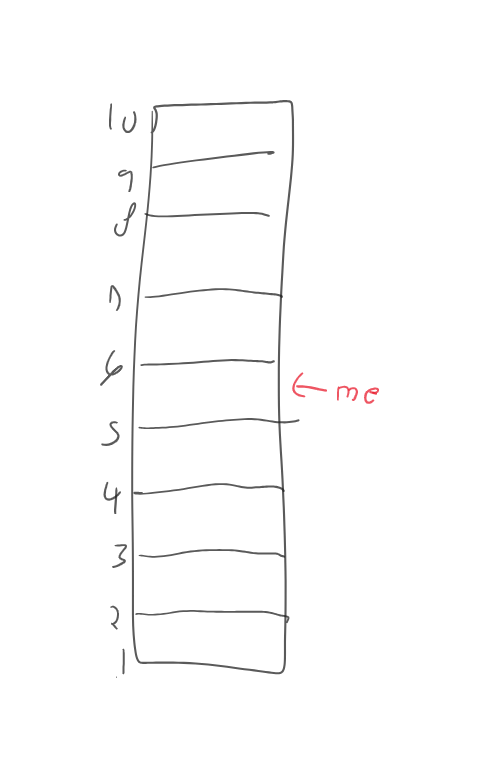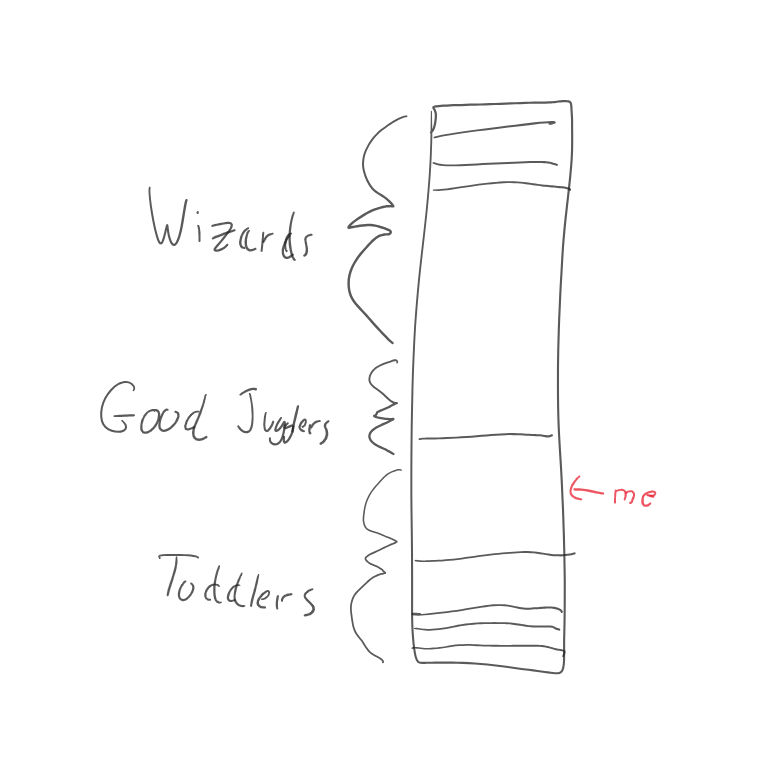The Juggler's Curse
It's too cold to go outside, so let's talk juggling.
I'm making a more focused effort to juggle this year. Mostly boxes, but also classic balls too.1 I've gotten to the point where I can almost consistently do a five-ball cascade, which I thought was the cutoff to being a "good juggler". "Thought" because I now know a "good juggler" is one who can do the five-ball cascade with outside throws.
I know this because I can't do the outside five-ball cascade... yet. But it's something I can see myself eventually mastering, unlike the slightly more difficult trick of the five-ball mess, which is impossible for mere mortals like me.
In theory there is a spectrum of trick difficulties and skill levels. I could place myself on the axis like this:

In practice, there are three tiers:
- Toddlers
- Good jugglers who practice hard
- Genetic freaks and actual wizards
And the graph always, always looks like this:

This is the jugglers curse, and it's a three-parter:
- The threshold between you and "good" is the next trick you cannot do.
- Everything below that level is trivial. Once you've gotten a trick down, you can never go back to not knowing it, to appreciating how difficult it was to learn in the first place.2
- Everything above that level is just "impossible". You don't have the knowledge needed to recognize the different tiers.3
So as you get better, the stuff that was impossible becomes differentiable, and you can see that some of it is possible. And everything you learned becomes trivial. So you're never a good juggler until you learn "just one more hard trick".
The more you know, the more you know you don't know and the less you know you know.
This is supposed to be a software newsletter
A monad is a monoid in the category of endofunctors, what's the problem? (src)
I think this applies to any difficult topic? Most fields don't have the same stark spectral lines as juggling, but there's still tiers of difficulty to techniques, which get compressed the further in either direction they are from your current level.
Like, I'm not good at formal methods. I've written two books on it but I've never mastered a dependently-typed language or a theorem prover. Those are equally hard. And I'm not good at modeling concurrent systems because I don't understand the formal definition of bisimulation and haven't implemented a Raft. Those are also equally hard, in fact exactly as hard as mastering a theorem prover.
At the same time, the skills I've already developed are easy: properly using refinement is exactly as easy as writing a wrapped counter. Then I get surprised when I try to explain strong fairness to someone and they just don't get how □◇(ENABLED〈A〉ᵥ) is obviously different from ◇□(ENABLED 〈A〉ᵥ).
Juggler's curse!
Now I don't actually know if this is actually how everybody experiences expertise or if it's just my particular personality— I was a juggler long before I was a software developer. Then again, I'd argue that lots of people talk about one consequence of the juggler's curse: imposter syndrome. If you constantly think what you know is "trivial" and what you don't know is "impossible", then yeah, you'd start feeling like an imposter at work real quick.
I wonder if part of the cause is that a lot of skills you have to learn are invisible. One of my favorite blog posts ever is In Defense of Blub Studies, which argues that software expertise comes through understanding "boring" topics like "what all of the error messages mean" and "how to use a debugger well". Blub is a critical part of expertise and takes a lot of hard work to learn, but it feels like trivia. So looking back on a skill I mastered, I might think it was "easy" because I'm not including all of the blub that I had to learn, too.
The takeaway, of course, is that the outside five-ball cascade is objectively the cutoff between good jugglers and toddlers.
-
Rant time: I love cigar box juggling. It's fun, it's creative, it's totally unlike any other kind of juggling. And it's so niche I straight up cannot find anybody in Chicago to practice with. I once went to a juggling convention and was the only person with a cigar box set there. ↩
-
This particular part of the juggler's curse is also called the curse of knowledge or "expert blindness". ↩
-
This isn't Dunning-Kruger, because DK says that people think they are better than they actually are, and also may not actually be real. ↩
-
When I started juggling my dream was to be able to do Rubinstein's Revenge. Surely if I could do that trick I'd have achieved bliss and wouldn't yearn to do anything else! About a year later I got it, bliss failed to materialize, I promptly moved on to the next trick, and rarely juggled RR at all, maybe once a year, mainly to remind myself how silly I had been.
Add a comment: